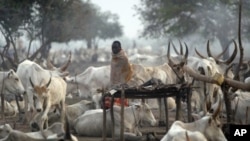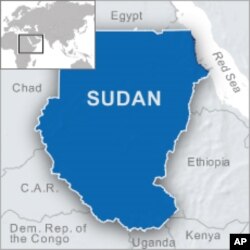Preliminary results show that Southern Sudan has overwhelmingly voted to secede from the north, Sudanese government officials say they will respect that decision and are turning their attention to the practicalities of breaking up Africa's largest country, including writing a new constitution and settling the status of the country's disputed oil region.
Sudan’s government in Khartoum will accept the will of the people in the South says Ibrahim Ghandour, who heads the ruling party’s political department in Khartoum.
"We have worked all the time to achieve unity. But nevertheless if they choose secession, we will be the first to recognize their choice," he said.
Southern Sudan’s challenges
Paul Malong Akaro, the deputy head of government of Southern Sudan’s mission in London says after fighting for independence for so long, the new government will have a lot to do.
"One of the biggest things of course is people’s expectations, these are expectations how we are going to manage it throughout this period," said Akaro. "And then the other thing of course, is reorganizing the government of Southern Sudan, that including [sic] writing the constitution."
Africa researcher Roger Middleton, with the London think tank Chatham House says both governments in Sudan will have to make many changes in the coming months.
"Generally we think about the challenges for Sudan, we think about the challenges for Southern Sudan," he said. "This is going to be a landlocked country, one of the poorest in the world, very little infrastructure. But sometimes we forget challenges for Northern Sudan, or I guess it’s just going to be called Sudan."
Middleton says the North will have to deal with the political fallout of losing 20 percent of the country’s population, the government will not want be blamed for the nation’s breakup, and that’s not all.
"They’re going to have to deal with the challenge of potentially losing a large amount of revenue from oil, they’re going to have to challenge of managing that relationship with southern Sudan, those pastoralists who cross the border, to graze their cattle in the South, what happens to them?" said Middleton.
Where nomads belong?
Some of those pastoralists, or nomads, are at the heart of one of the unresolved issues in Sudan - the disputed oil region of Abyei. Its residents did not take part in the independence referendum because the two sides could not agree on who is a resident there. The Khartoum government wanted the nomads to vote, the south did not. Akaro explains.
"It is not right, it is not correct," he said. "They came there to graze but they shouldn’t be entitled to vote or to participate in the decision making of how, where Abyei wants to be administered."
"Everything in Abyei should be shared between the two communities a northern community and a southern community. We will give them an equal share in the oil, we will give them an equal share in power, we will give them the right of the protection of the presidency," said Aldiri Mohamed Ahmed, Khartoum’s negotiator for Abyei.
Sharing oil revenue
Akaro says there is only one reason the north is making an issue of it.
"They are making the situation in Abyei difficult because of the oil, nothing other than that," he said.
But Ghandouri believes eventually oil will unite the nation.
"Sudanese oil is produced in North and South with the south producing almost 76 to 80 percent of the total input and while that is the case, all the infrastructure in the North," he said.
The landlocked south will depend on the north to export its oil. Abyei, home to a number of the fields sits on the dividing line and is a potential flashpoint, says William Morris, who heads the Next Century Foundation, a London research organization.
"The people in Abyei are not getting the chance to vote and it could become a real firecracker issue, very dangerous," said Morris, and he says a solution needs to be found soon.
"If we don’t see some resolution of matters or at least an early indication that there’s going to be a resolution of matters, then people will begin to get angry and come the summer that anger will boil over, and we will have some real violence. So we really do need that one issue to be resolved desperately."
Determining nationalities
Negotiators will meet again this month to discuss Abyei. Both sides hope there is a solution before July 9, when the south is expected to declare independence.
Before then, there are other issues to work out. Some southern Sudanese who fled to the north during decades of war might want to return south. Ghandour says each case will be considered and no one will be left without nationality.
"All Southern Sudanese in the North, they can stay," he said. "They can enjoy whatever jobs they are in now, those students who in university they continue up until graduation. Of course there are some who has to leave their jobs, particularly those in security, in the army or the police."
Both the north and south have to change their respective constitutions to reflect the reality of their new nations. One thing they agree on, both governments will remain in place for the next few years, to manage one of the biggest changes in Africa.





